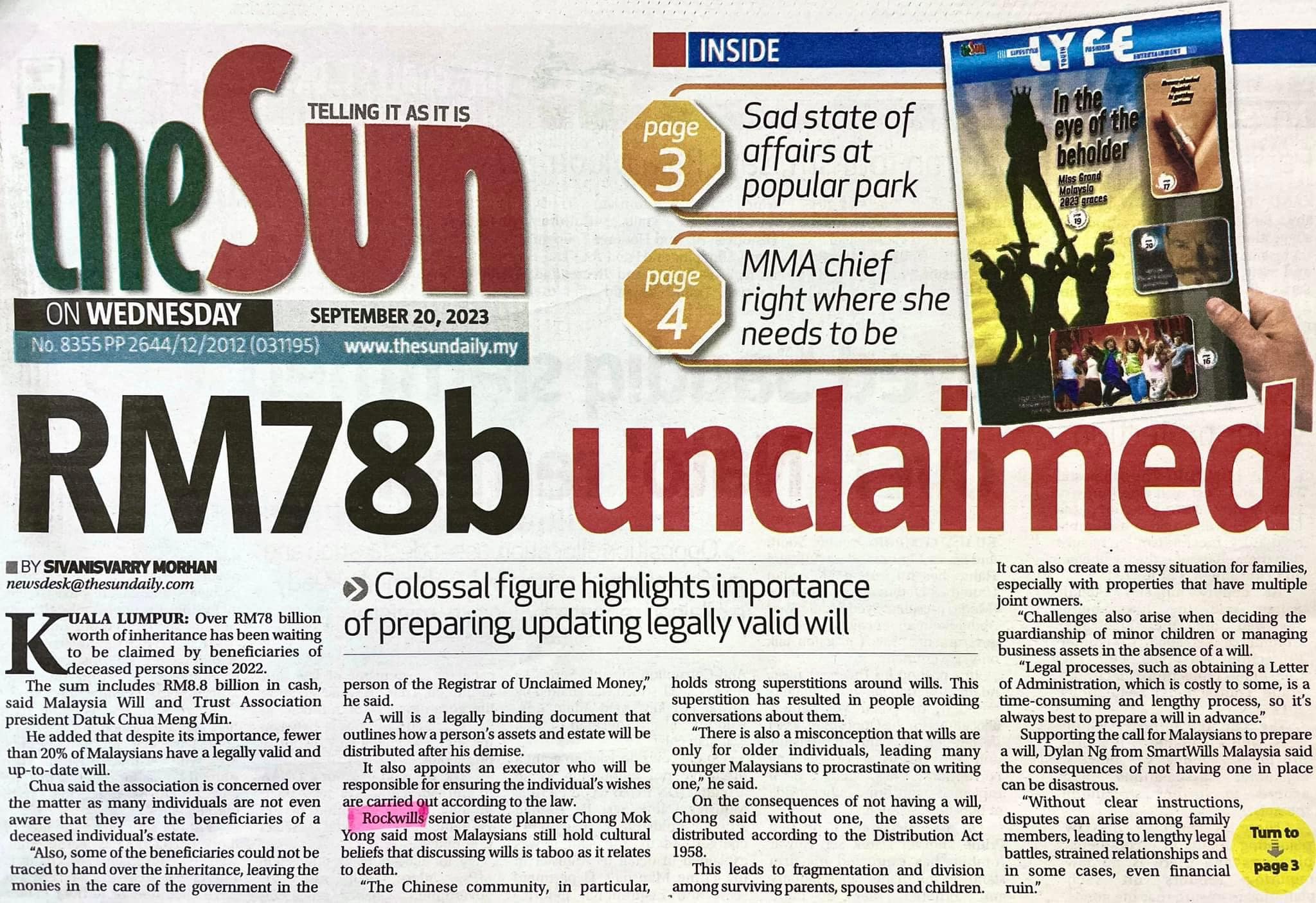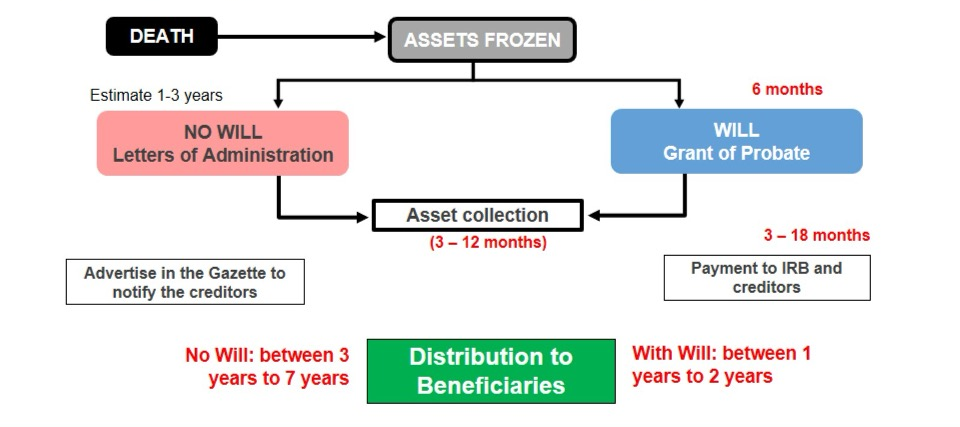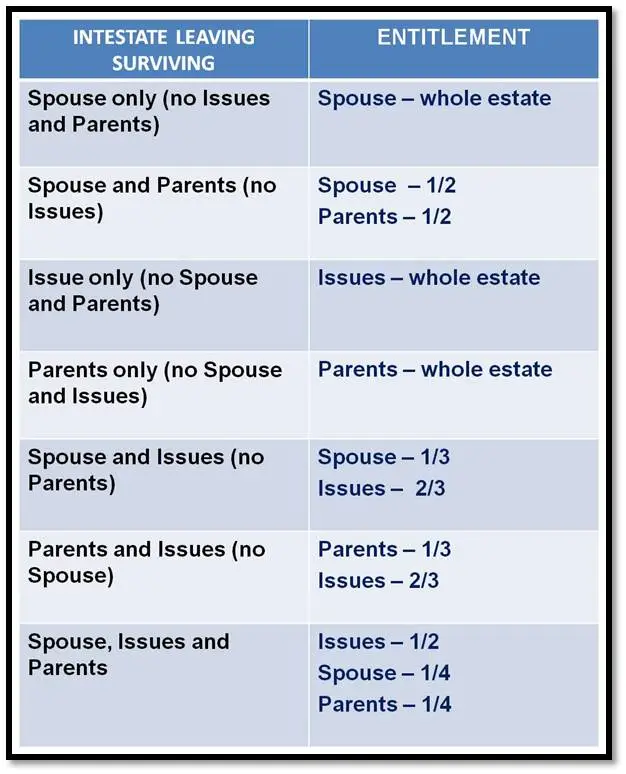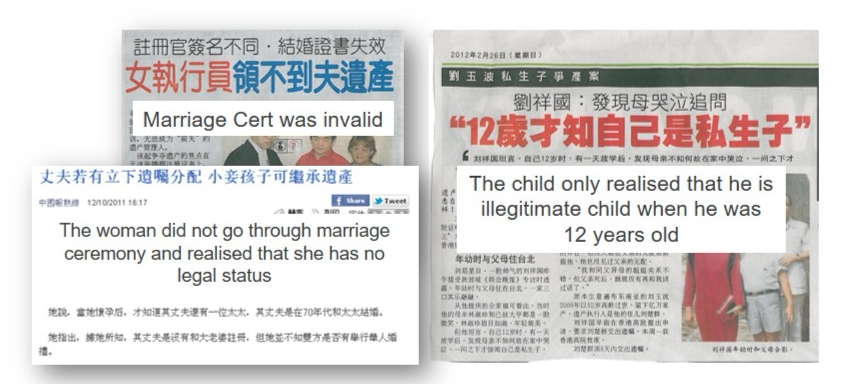

You can actually prevent your assets from being frozen or falling into the hands of others through professional asset planning!
By making arrangements
during your lifetime,
you can prevent unnecessary situations from affecting your family.
Comprehensive asset planning will ensure proper arrangements and distribution of the inheritance you leave behind for you and your family.
Things you might not know?

Did you know over RM78 billion in inheritance
is unclaimed in Malaysia since 2022?
Shockingly, less than 20% of Malaysians
have a legally valid and updated will.
The solution?
Plan early, prepare a will.
Don’t let your loved ones face unnecessary struggles.
Protect your legacy by ensuring your estate is distributed according to your wishes.
Do you know what RM78 billion can do?

Why are so many inheritances frozen?
Overwhelming Debt
If the deceased had too much debt during their lifetime, beneficiaries may choose to forgo the inheritance. Additionally, creditors can file in court to prevent the deceased's assets from being cashed out.
No Will
Nearly 90% of non-Muslims in Malaysia do not have a will in place, and many people are unaware of the importance of preparing one. When an unforeseen event occurs, beneficiaries often have to spend more time and go through more complex legal procedures to unfreeze the inheritance. On average, the process of unfreezing an inheritance takes at least 3 to 5 years.
Unrecorded Assets or Assets in Third-Party Names
Many Malaysians do not have the habit of keeping proper records of their personal assets, especially information on land or real estate. This creates more difficulties for beneficiaries during the inheritance process. Additionally, joint purchases or investments where assets are registered under someone else’s name further complicates the process of claiming the inheritance for beneficiaries.
For Minor Children
Under Malaysian law, beneficiaries under the age of 18 cannot inherit assets. If the legal beneficiaries are only minor children, all assets must be transferred to a public trust company. The beneficiaries can only claim the inheritance from the trust company once they reach 18 years old.
Income Tax Audits
The deceased’s income tax for the year of their death must be filed. Furthermore, once the inheritance is disclosed, if the tax authorities find that the inheritance does not align with the deceased’s declared income, they may request a tax review. If there are discrepancies between the deceased's income and the inheritance, the tax authorities may require the beneficiaries to settle all outstanding taxes before the inheritance can be released. If the tax liabilities are too large or the beneficiaries lack liquid cash, they may abandon the process of unfreezing the inheritance.
Disputes Among Beneficiaries
A lack of proper planning, large assets, or unequal distribution of wealth can lead to family disputes, delaying the process of unfreezing the inheritance.
The Consequences of Not Having a Will!
Need to apply for a Letter of Administration from the court
When a person passes away, all their assets are frozen. Family members must apply for a Letter of Administration from the court to unfreeze and handle the inheritance, which is a time-consuming and costly process.
Potential disputes over inheritance management rights
Before applying for the Letter of Administration, all heirs must unanimously agree on selecting one person to act as the estate administrator. If an heir nominates someone else, they must give up their own right to the position. In cases with multiple heirs, choosing an administrator can lead to family conflicts, and the chosen person may not align with the deceased's preference. However, if a will exists with a trusted executor and trustee named, it can greatly reduce family disputes.
The court requires two estate guarantors
To ensure the administrator performs their duties properly and prevents misappropriation, the court requires two guarantors whose assets must equal the value of the estate. For large estates, such as those worth millions, finding guarantors with equivalent wealth can be very challenging. If suitable guarantors cannot be found, family members can request relaxed requirements or ask the court to waive the guarantor requirement. These challenges may delay the approval of the Letter of Administration.
Inheritance distribution is controlled by law
Many people mistakenly believe that their estate will automatically go to their spouse or children after their death. In reality, without a will, the estate will be distributed according to the Distribution Act 1958 (Amended 1997), which may not align with the deceased’s wishes, potentially leaving assets to individuals the deceased would not have preferred.
If there is no will, how will the inheritance be distributed?
Inheritance Distribution Process

If you don't write a will, the government will use the law to distribute your assets.
Although it will be distributed, is it really what you want?

Inheritance dispute cases



To avoid the situations mentioned above, it is truly necessary to write a will and distribute our future assets according to our wishes.
Moreover, we may not want to leave all our assets to the legal heirs but instead allocate part of the inheritance to benefactors, friends, charities, godchildren, or even illegitimate children.
The most appropriate solution is to write a will and clearly express our intentions.
How Can a Will Help You?
With a will, you can choose your desired beneficiaries, instead of relying on the law for intestacy to make that decision for you.
10 Reasons to Write a Will
Provide financial security for your loved ones.
Gift your assets and money as you wish.
Appoint a guardian for your minor children.
Choose your executor.
Avoid inheritance disputes.
Protect your lifelong property rights.
Specify your funeral wishes.
Shorten the inheritance distribution process.
Reduce the cost of estate administration.
Express your preferences for funeral arrangements.
FAQ
What is a will?
A will is a legal document that details a person's specific wishes for distributing their assets after death.
What are the benefits of having a will?
With a will, you can decide who your beneficiaries are and how to distribute your assets. You can also appoint trusted individuals to manage your estate, set up trusts for minor children or dependents with special needs, appoint guardians, reduce family disputes, expedite the distribution process, lower administrative costs, and pre-plan your funeral arrangements.
What happens if someone dies without a will?
If there is no will, your assets will be distributed according to a pre-determined formula under the law, which may not align with your wishes. Additionally, the court will appoint a trustee and administrator, which could lead to disputes among family members. The court may also appoint a guardian for minor children who may not be your preferred choice. This process is often more time-consuming and expensive.
Who will inherit my assets under the law?
If there is no will, asset distribution will follow the Distribution Act 1958 (Amended 1997). For instance, if you leave behind a spouse and children, the spouse will inherit one-third, while the children inherit two-thirds.
What makes a will valid?
You must be at least 18 years old, of sound mind, and the will must be in writing and signed by you. Additionally, there must be at least two witnesses present to sign the will.
Can beneficiaries witness the will?
No, if a beneficiary or their spouse acts as a witness to the will, they will lose their right to inherit under the will.
How long is a will valid?
A will remains valid until you create a new one, revoke it in writing, or intentionally destroy it. Changes in marital status or religion may automatically revoke a will.
How does marriage or divorce affect a will?
Marriage or remarriage typically invalidates an existing will unless it includes provisions for the marriage. Divorce does not affect the validity of a will, but updating it is recommended in such cases.
What are the duties of an executor and trustee?
An executor ensures the instructions in the will are carried out, including collecting assets, paying debts, distributing assets as per the will, and preparing financial reports. Executors also act as trustees until all assets are fully distributed.
Who can be my executor or trustee?
You can appoint any adult over 18 as your executor or trustee. This can be an individual or a trust company, depending on the size and complexity of the estate.
Can beneficiaries act as executors?
Yes, beneficiaries can be executors, which is common when leaving assets to financially capable adult children or spouses.
Should I inform my chosen executor?
Yes, you should notify them and ensure they are willing and able to take on the responsibility.
Where should I store my will?
A will should be kept in a safe place, such as a will custody service, and the executor should know where it is stored.
Should I provide my executor with a copy of the will?
This is a personal choice, but the executor should at least know how to locate the will when needed.
What if the original will is lost?
If the original will is lost but can be proven not to have been revoked, the court may accept a copy of the will.
Can executors be paid from the estate?
Yes, executors and trustees are entitled to reasonable compensation for managing the estate. Trust companies usually have fixed fees.
What assets should my will include?
Your will should cover all your major assets, such as real estate, personal belongings, and intellectual property, in as much detail as possible.
Do I need to list every single asset in my will?
Not necessarily. Major categories of assets should be included to help the executor identify and manage them effectively.
What happens if I miss assets or acquire new ones?
Your will should include a residual clause to handle unmentioned assets. For new significant assets, update the will or add a codicil.
Can my will include insurance or EPF?
Insurance benefits will go to the nominated beneficiaries specified in the policy and cannot be overridden by a will. Similarly, EPF (Employees Provident Fund) payments will follow your registered nominees. If there is no EPF nomination, the fund will be distributed according to your will.
Can I include foreign assets in my will?
Yes, but administering these assets may require additional legal procedures. It is advisable to create a separate will for foreign assets.
Is a will made abroad valid in Malaysia?
Generally, yes. Your executor can apply to the High Court in Malaysia to reseal the probate granted overseas, enabling them to manage and distribute your Malaysian assets as per your will.
Should I appoint a guardian in my will?
If you have minor children, you should appoint a guardian in your will.
What is a testamentary trust?
A testamentary trust is a trust arrangement set up within a will to manage and distribute assets after death or preserve them for specific purposes.
How is a testamentary trust different from a living trust?
A living trust is established and takes effect during the person's lifetime, while a testamentary trust takes effect only after death. Living trusts do not require probate.
Can my will be contested?
A will can be contested for reasons such as undue influence, forgery, or issues with witnesses. Clear and detailed terms can reduce disputes.
Can the court override my will?
Under the Inheritance (Family Provision) Act 1971, the court may allocate part of the estate to dependents (e.g., spouse, unmarried daughters, minor sons, or children with disabilities) if it deems the will provides insufficient support. The court considers factors such as the size of the estate, the dependents' needs, and the deceased's wishes.
Does my will need to be stamped?
No, a will is valid without being stamped.
Is inheritance tax applicable to my estate?
No. Inheritance tax has been abolished in Malaysia for deaths occurring on or after November 1, 1991.
Should I rewrite my will?
If there are significant changes in your life, family, or assets, you should update your will to reflect these changes.
Start Your Estate Planning Today
Ensure your assets are passed on according
to your wishes.
Plan for the future together to ensure your assets and desires are properly managed and respected.
Take control of the future and safeguard the legacy of your wealth.

